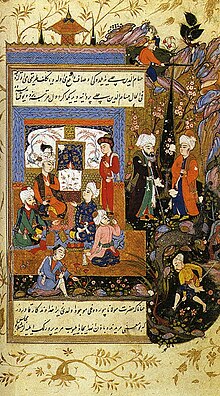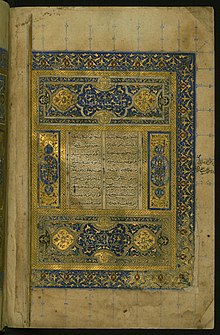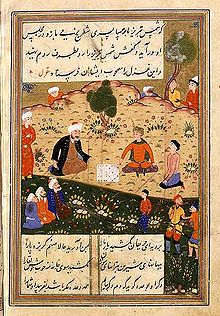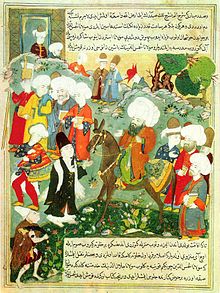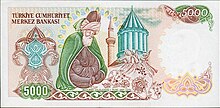Rumi
Biography
| Rūmī | |
|---|---|
 Statue of Rumi in Buca | |
Rumi's works are written mostly in Persian, but occasionally he also used Turkish, Arabic, and Greek, in his verse. His Masnavi (Mathnawi), composed in Konya, is considered one of the greatest poems of the Persian language. His works are widely read today in their original language across Greater Iran and the Persian-speaking world. Translations of his works are very popular, most notably in Turkey, Azerbaijan, the United States, and South Asia. His poetry has influenced not only Persian literature, but also Turkish, Ottoman Turkish, Azerbaijani, as well as the literature of some other Turkic, Iranian, and Indo-Aryan languagesincluding Chagatai, Urdu and Pashto. A deep grasp of his original poetry requires excellent command of modern Persian, and an equally good command of Islamic prophetic traditions, and the Qur'an. With such command, one may succeed in peeling back the multitude layers of meaning.
Name
He is most commonly called Rumi in English. His full name is Jalāl ad-Dīn Muḥammad Balkhī (Persian: جلالالدین محمد بلخى) or Jalāl ad-Dīn Muḥammad Rūmī (جلالالدین محمد رومی). Jalal ad-Din is an Arabic name meaning "Glory of the Faith". Balkhī and Rūmī are his nisbas, meaning "from Balkh" and "from Rûm" (Roman Anatolia), respectively. According to the authoritative Rumi biographer Franklin Lewis of the University of Chicago, "[t]he Anatolian peninsula which had belonged to the Byzantine, or eastern Roman empire, had only relatively recently been conquered by Muslims and even when it came to be controlled by Turkish Muslim rulers, it was still known to Arabs, Persians and Turks as the geographical area of Rum. As such, there are a number of historical personages born in or associated with Anatolia known as Rumi, a word borrowed from Arabic literally meaning 'Roman,' in which context Roman refers to subjects of the Byzantine Empire or simply to people living in or things associated with Anatolia."
He is widely known by the sobriquet Mawlānā/Molānā (Persian: مولانا Persian pronunciation: [moulɒːnɒ]) in Iran and popularly known as Mevlânâ in Turkey. Mawlānā(مولانا) is a term of Arabic origin, meaning "our master".
The term مولوی Mawlawī/Mowlavi (Persian) and Mevlevi (Turkish), also of Arabic origin, meaning "my master", is also frequently used for him.
Life
Rumi was born to native Persian-speaking parents, originally from the Balkh, in present-day Afghanistan. He was born either in Wakhsh, a village on the Vakhsh River in present-day Tajikistan, or in the city of Balkh, in present-day Afghanistan.
Greater Balkh was at that time a major centre of Persian culture and Sufism had developed there for several centuries. The most important influences upon Rumi, besides his father, were the Persian poets Attar and Sanai. Rumi expresses his appreciation: "Attar was the spirit, Sanai his eyes twain, And in time thereafter, Came we in their train" and mentions in another poem: "Attar has traversed the seven cities of Love, We are still at the turn of one street". His father was also connected to the spiritual lineage of Najm al-Din Kubra.
Rumi lived most of his life under the Persianate Seljuk Sultanate of Rum, where he produced his works and died in 1273 AD. He was buried in Konya, and his shrine became a place of pilgrimage. Upon his death, his followers and his son Sultan Walad founded the Mevlevi Order, also known as the Order of the Whirling Dervishes, famous for the Sufi dance known as the Sama ceremony. He was laid to rest beside his father, and over his remains a shrine was erected. A hagiographical account of him is described in Shams ud-Din Ahmad Aflāki's Manāqib ul-Ārifīn (written between 1318 and 1353). This biography needs to be treated with care as it contains both legends and facts about Rumi. For example, Professor Franklin Lewis of the University of Chicago, author of the most complete biography on Rumi, has separate sections for the hagiographical biography of Rumi and the actual biography about him.
Rumi's father was Bahā ud-Dīn Walad, a theologian, jurist and a mystic from Balkh, who was also known by the followers of Rumi as Sultan al-Ulama or "Sultan of the Scholars". The popular hagiographical assertions that have claimed the family's descent from the Caliph Abu Bakr does not hold on closer examination and is rejected by modern scholars. The claim of maternal descent from the Khwarazmshah for Rumi or his father is also seen as a non-historical hagiographical tradition designed to connect the family with royalty, but this claim is rejected for chronological and historical reasons. The most complete genealogy offered for the family stretches back to six or seven generations to famous Hanafi jurists.
We do not learn the name of Baha al-Din's mother in the sources, only that he referred to her as "Māmi" (colloquial Persian for Māma), and that she was a simple woman who lived to the 1200s. The mother of Rumi was Mu'mina Khātūn. The profession of the family for several generations was that of Islamic preachers of the liberal Hanafi rite, and this family tradition was continued by Rumi (see his Fihi Ma Fih and Seven Sermons) and Sultan Walad (see Ma'rif Waladi for examples of his everyday sermons and lectures).
When the Mongols invaded Central Asia sometime between 1215 and 1220, Baha ud-Din Walad, with his whole family and a group of disciples, set out westwards. According to hagiographical account which is not agreed upon by all Rumi scholars, Rumi encountered one of the most famous mystic Persian poets, Attar, in the Iranian city of Nishapur, located in the province of Khorāsān. Attar immediately recognized Rumi's spiritual eminence. He saw the father walking ahead of the son and said, "Here comes a sea followed by an ocean." He gave the boy his Asrārnāma, a book about the entanglement of the soul in the material world. This meeting had a deep impact on the eighteen-year-old Rumi and later on became the inspiration for his works.
From Nishapur, Walad and his entourage set out for Baghdad, meeting many of the scholars and Sufis of the city. From Baghdad they went to Hejaz and performed the pilgrimage at Mecca. The migrating caravan then passed through Damascus, Malatya, Erzincan, Sivas, Kayseri and Nigde. They finally settled in Karaman for seven years; Rumi's mother and brother both died there. In 1225, Rumi married Gowhar Khatun in Karaman. They had two sons: Sultan Walad and Ala-eddin Chalabi. When his wife died, Rumi married again and had a son, Amir Alim Chalabi, and a daughter, Malakeh Khatun.
On 1 May 1228, most likely as a result of the insistent invitation of 'Alā' ud-Dīn Key-Qobād, ruler of Anatolia, Baha' ud-Din came and finally settled in Konya in Anatoliawithin the westernmost territories of the Seljuk Sultanate of Rûm.
Baha' ud-Din became the head of a madrassa (religious school) and when he died, Rumi, aged twenty-five, inherited his position as the Islamic molvi. One of Baha' ud-Din's students, Sayyed Burhan ud-Din Muhaqqiq Termazi, continued to train Rumi in the Shariah as well as the Tariqa, especially that of Rumi's father. For nine years, Rumi practised Sufism as a disciple of Burhan ud-Din until the latter died in 1240 or 1241. Rumi's public life then began: he became an Islamic Jurist, issuing fatwas and giving sermons in the mosques of Konya. He also served as a Molvi (Islamic teacher) and taught his adherents in the madrassa.
During this period, Rumi also travelled to Damascus and is said to have spent four years there.
It was his meeting with the dervish Shams-e Tabrizi on 15 November 1244 that completely changed his life. From an accomplished teacher and jurist, Rumi was transformed into an ascetic.
Shams had travelled throughout the Middle East searching and praying for someone who could "endure my company". A voice said to him, "What will you give in return?" Shams replied, "My head!" The voice then said, "The one you seek is Jalal ud-Din of Konya." On the night of 5 December 1248, as Rumi and Shams were talking, Shams was called to the back door. He went out, never to be seen again. It is rumoured that Shams was murdered with the connivance of Rumi's son, 'Ala' ud-Din; if so, Shams indeed gave his head for the privilege of mystical friendship.
Rumi's love for, and his bereavement at the death of, Shams found their expression in an outpouring of lyric poems, Divan-e Shams-e Tabrizi. He himself went out searching for Shams and journeyed again to Damascus. There, he realised:
Mewlana had been spontaneously composing ghazals (Persian poems), and these had been collected in the Divan-i Kabir or Diwan Shams Tabrizi. Rumi found another companion in Salaḥ ud-Din-e Zarkub, a goldsmith. After Salah ud-Din's death, Rumi's scribe and favourite student, Hussam-e Chalabi, assumed the role of Rumi's companion. One day, the two of them were wandering through the Meram vineyards outside Konya when Hussam described to Rumi an idea he had had: "If you were to write a book like the Ilāhīnāma of Sanai or the Mantiq ut-Tayr of 'Attar, it would become the companion of many troubadours. They would fill their hearts from your work and compose music to accompany it." Rumi smiled and took out a piece of paper on which were written the opening eighteen lines of his Masnavi, beginning with:
Hussam implored Rumi to write more. Rumi spent the next twelve years of his life in Anatolia dictating the six volumes of this masterwork, the Masnavi, to Hussam.
In December 1273, Rumi fell ill; he predicted his own death and composed the well-known ghazal, which begins with the verse:
Rumi died on 17 December 1273 in Konya; his body was interred beside that of his father, and a splendid shrine, the Yeşil Türbe (Green Tomb, قبه الخضراء; today the Mevlâna Museum), was erected over his place of burial. His epitaph reads:
Georgian Queen Gürcü Hatun was a close friend of Rumi. She was the one who sponsored the construction of his tomb in Konya. The 13th century Mevlâna Mausoleum, with its mosque, dance hall, dervish living quarters, school and tombs of some leaders of the Mevlevi Order, continues to this day to draw pilgrims from all parts of the Muslim and non-Muslim world. Jalal al-Din who is also known as Rumi, was a philosopher and mystic of Islam.
Teachings
The general theme of Rumi's thought, like that of other mystic and Sufi poets of Persian literature, is that of tawhid — union with the Beloved, from whom he sees himself as being cut off and aloof. His longing and desire to attain it is evident in the following poem from his book the Masnavi:
از جمادی مُردم و نامی شدم وز نما مُردم به حیوان برزدم مُردم از حیوانی و آدم شدم پس چه ترسم کی ز مردن کم شدم؟ حملهٔ دیگر بمیرم از بشر تا برآرم از ملائک بال و پر وز ملک هم بایدم جستن ز جو کل شیء هالک الا وجهه بار دیگر از ملک پران شوم آنچ اندر وهم ناید آن شوم پس عدم گردم عدم چون ارغنون گویدم که انا الیه راجعون | I died to the mineral state and became a plant, I died to the vegetal state and reached animality, I died to the animal state and became a man, Then what should I fear? I have never become less from dying. At the next charge (forward) I will die to human nature, So that I may lift up (my) head and wings (and soar) among the angels, And I must (also) jump from the river of (the state of) the angel, Everything perishes except His Face, Once again I will become sacrificed from (the state of) the angel, I will become that which cannot come into the imagination, Then I will become non-existent; non-existence says to me (in tones) like an organ, Truly, to Him is our return. |
The Masnavi weaves fables, scenes from everyday life, Qur'anic revelations and exegesis, and metaphysics into a vast and intricate tapestry. In the East, it is said of him that he was "not a prophet — but surely, he has brought a scripture."
Rumi believed passionately in the use of music, poetry and dance as a path for reaching God. For Rumi, music helped devotees to focus their whole being on the divine and to do this so intensely that the soul was both destroyed and resurrected. It was from these ideas that the practice of whirling Dervishes developed into a ritual form. His teachings became the base for the order of the Mevlevi, which his son Sultan Walad organised. Rumi encouraged Sama, listening to music and turning or doing the sacred dance. In the Mevlevi tradition, samāʿ represents a mystical journey of spiritual ascent through mind and love to the Perfect One. In this journey, the seeker symbolically turns towards the truth, grows through love, abandons the ego, finds the truth and arrives at the Perfect. The seeker then returns from this spiritual journey, with greater maturity, to love and to be of service to the whole of creation without discrimination with regard to beliefs, races, classes and nations.
In other verses in the Masnavi, Rumi describes in detail the universal message of love:
Rumi's favourite musical instrument was the ney (reed flute).
Major works
Rumi's poetry is often divided into various categories: the quatrains (rubayāt) and odes (ghazal) of the Divan, the six books of the Masnavi. The prose works are divided into The Discourses, The Letters, and the Seven Sermons.
Poetic works
- Rumi's major work is the Maṭnawīye Ma'nawī (Spiritual Couplets; مثنوی معنوی), a six-volume poem regarded by some Sufis as the Persian-language Qur'an. It is considered by many to be one of the greatest works of mystical poetry. It contains approximately 27,000 lines of Persian poetry.
- Rumi's other major work is the Dīwān-e Kabīr (Great Work) or Dīwān-e Shams-e Tabrīzī (The Works of Shams of Tabriz; دیوان شمس تبریزی), named in honour of Rumi's master Shams. Besides approximately 35000 Persian couplets and 2000 Persian quatrains, the Divan contains 90 Ghazals and 19 quatrains in Arabic,a couple of dozen or so couplets in Turkish (mainly macaronic poems of mixed Persian and Turkish) and 14 couplets in Greek (all of them in three macaronic poems of Greek-Persian).
Prose works
- Fihi Ma Fihi (In It What's in It, Persian: فیه ما فیه) provides a record of seventy-one talks and lectures given by Rumi on various occasions to his disciples. It was compiled from the notes of his various disciples, so Rumi did not author the work directly. An English translation from the Persian was first published by A.J. Arberry as Discourses of Rumi (New York: Samuel Weiser, 1972), and a translation of the second book by Wheeler Thackston, Sign of the Unseen (Putney, VT: Threshold Books, 1994). The style of the Fihi ma fihi is colloquial and meant for middle-class men and women, and lack the sophisticated wordplay.
- Majāles-e Sab'a (Seven Sessions, Persian: مجالس سبعه) contains seven Persian sermons (as the name implies) or lectures given in seven different assemblies. The sermons themselves give a commentary on the deeper meaning of Qur'an and Hadith. The sermons also include quotations from poems of Sana'i, 'Attar, and other poets, including Rumi himself. As Aflakī relates, after Shams-e Tabrīzī, Rumi gave sermons at the request of notables, especially Salāh al-Dīn Zarkūb. The style of Persian is rather simple, but quotation of Arabic and knowledge of history and the Hadith show Rumi's knowledge in the Islamic sciences. His style is typical of the genre of lectures given by Sufis and spiritual teachers.
- Makatib (The Letters, Persian: مکاتیب) is the book containing Rumi's letters in Persian to his disciples, family members, and men of state and of influence. The letters testify that Rumi kept very busy helping family members and administering a community of disciples that had grown up around them. Unlike the Persian style of the previous two mentioned works (which are lectures and sermons), the letters are consciously sophisticated and epistolary in style, which is in conformity with the expectations of correspondence directed to nobles, statesmen and kings.
Religious outlook
Rumi belongs to the class of Islamic philosophers which include Ibn Arabi and Mulla Sadra. These transcendental philosophers are often studied together in traditional schools of irfan, philosophy and theosophy throughout the Muslim world.
Rumi embeds his theosophy (transcendental philosophy) like a string through the beads of his poems and stories. His main point and emphasis is the unity of being.
It is undeniable that Rumi was a Muslim scholar and took Islam seriously. Nonetheless, the depth of his spiritual vision extended beyond narrow understanding sectarian concerns. One rubaiyat reads:
در راه طلب عاقل و دیوانه یکی است در شیوهی عشق خویش و بیگانه یکی است آن را که شراب وصل جانان دادند در مذهب او کعبه و بتخانه یکی است | On the seeker’s path, wise men and fools are one. In His love, brothers and strangers are one. Go on! Drink the wine of the Beloved! In that faith, Muslims and pagans are one. |
| —Quatrain 305 |
According to the Quran, Prophet Muhammad is a mercy sent by God to the Aalameen (to all creation), including humanity overall. In regards to this, Rumi states:
Rumi, however, asserts the supremacy of Islam by stating:
Many of Rumi's poems suggest the importance of outward religious observance and the primacy of the Qur'an.
Rumi states:
Rumi also states:
On the first page of the Masnavi, Rumi states:
Seyyed Hossein Nasr states:
Rumi states in his Dīwān:
His Masnavi contains anecdotes and stories derived largely from the Quran and the hadith, as well as everyday tales.
Legacy
Rumi's poetry forms the basis of much classical Iranian and Afghan music. Contemporary classical interpretations of his poetry are made by Muhammad Reza Shajarian, Shahram Nazeri, Davood Azad(the three from Iran) and Ustad Mohammad Hashem Cheshti (Afghanistan). To many modern Westerners, his teachings are one of the best introductions to the philosophy and practice of Sufism. In the West Shahram Shiva has been teaching, performing and sharing the translations of the poetry of Rumi for nearly twenty years and has been instrumental in spreading Rumi's legacy in the English-speaking parts of the world. Pakistan's National Poet, Muhammad Iqbal, was also inspired by Rumi's works and considered him to be his spiritual leader, addressing him as "Pir Rumi" in his poems (the honorific Pir literally means "old man", but in the Sufi/mystic context it means founder, master, or guide).
Shahram Shiva asserts that "Rumi is able to verbalise the highly personal and often confusing world of personal growth and development in a very clear and direct fashion. He does not offend anyone, and he includes everyone.... Today Rumi's poems can be heard in churches, synagogues, Zen monasteries, as well as in the downtown New York art/performance/music scene."
According to Professor Majid M. Naini, "Rumi's life and transformation provide true testimony and proof that people of all religions and backgrounds can live together in peace and harmony. Rumi’s visions, words, and life teach us how to reach inner peace and happiness so we can finally stop the continual stream of hostility and hatred and achieve true global peace and harmony.”
Rumi's work has been translated into many of the world's languages, including Russian, German, Urdu, Turkish, Arabic, Bengali, French, Italian, and Spanish, and is being presented in a growing number of formats, including concerts, workshops, readings, dance performances, and other artistic creations. The English interpretations of Rumi's poetry by Coleman Barks have sold more than half a million copies worldwide, and Rumi is one of the most widely read poets in the United States. Shahram Shiva book "Rending the Veil: Literal and Poetic Translations of Rumi" (1995, HOHM Press) is the recipient of the Benjamin Franklin Award.
Recordings of Rumi poems have made it to the USA's Billboard's Top 20 list. A selection of American author Deepak Chopra's editing of the translations by Fereydoun Kia of Rumi's love poems has been performed by Hollywood personalities such as Madonna, Goldie Hawn, Philip Glass and Demi Moore.
There is a famous landmark in Northern India, known as Rumi Gate, situated in Lucknow (the capital of Uttar Pradesh) named for Rumi.
Rumi and his mausoleum were depicted on the reverse of the 5000 Turkish lira banknotes of 1981–1994.
Iranian world
These cultural, historical and linguistic ties between Rumi and Iran have made Rumi an iconic Iranian poet, and some of the most important Rumi scholars including Foruzanfar, Naini, Sabzewari, etc., have come from modern Iran. Rumi's poetry is displayed on the walls of many cities across Iran, sung in Persian music, and read in school books.
Mewlewī Sufi Order
The Mewlewī Sufi order was founded in 1273 by Rumi's followers after his death. His first successor in the rectorship of the order was "Husam Chalabi" himself, after whose death in 1284 Rumi's younger and only surviving son, Sultan Walad (died 1312), popularly known as author of the mystical Maṭnawī Rabābnāma, or the Book of the Rabab was installed as grand master of the order. The leadership of the order has been kept within Rumi's family in Konya uninterruptedly since then. The Mewlewī Sufis, also known as Whirling Dervishes, believe in performing their dhikr in the form of Sama. During the time of Rumi (as attested in the Manāqib ul-Ārefīn of Aflākī), his followers gathered for musical and "turning" practices.
According to tradition, Rumi was himself a notable musician who played the robāb, although his favourite instrument was the ney or reed flute. The music accompanying the samāʿ consists of settings of poems from the Maṭnawī and Dīwān-e Kabīr, or of Sultan Walad's poems. The Mawlawīyah was a well-established Sufi order in the Ottoman Empire, and many of the members of the order served in various official positions of the Caliphate. The centre for the Mevlevi was in Konya. There is also a Mewlewī monastery (درگاه, dargāh) in Istanbul near the Galata Tower in which the samāʿ is performed and accessible to the public. The Mewlewī order issues an invitation to people of all backgrounds:
| “ | Come, come, whoever you are, Wanderer, idolater, worshiper of fire, Come even though you have broken your vows a thousand times, Come, and come yet again. Ours is not a caravan of despair. | ” |
During Ottoman times, the Mevlevi produced a number of notable poets and musicians, including Sheikh Ghalib, Ismail Rusuhi Dede of Ankara, Esrar Dede, Halet Efendi, and Gavsi Dede, who are all buried at the Galata Mewlewī Khāna (Turkish: Mevlevi-Hane) in Istanbul.Music, especially that of the ney, plays an important part in the Mevlevi.
With the foundation of the modern, secular Republic of Turkey, Mustafa Kemal Atatürk removed religion from the sphere of public policy and restricted it exclusively to that of personal morals, behaviour and faith. On 13 December 1925, a law was passed closing all the tekkes (dervish lodges) and zāwiyas (chief dervish lodges), and the centres of veneration to which visits (ziyārat) were made. Istanbul alone had more than 250 tekkes as well as small centres for gatherings of various fraternities; this law dissolved the Sufi Orders, prohibited the use of mystical names, titles and costumes pertaining to their titles, impounded the Orders' assets, and banned their ceremonies and meetings. The law also provided penalties for those who tried to re-establish the Orders. Two years later, in 1927, the Mausoleum of Mevlâna in Konya was allowed to reopen as a Museum.
In the 1950s, the Turkish government began allowing the Whirling Dervishes to perform once a year in Konya. The Mewlānā festival is held over two weeks in December; its culmination is on 17 December, the Urs of Mewlānā (anniversary of Rumi's death), called Šabe Arūs (شب عروس) (Persian meaning "nuptial night"), the night of Rumi's union with God. In 1974, the Whirling Dervishes were permitted to travel to the West for the first time. In 2005, UNESCO proclaimed "The Mevlevi Sama Ceremony" of Turkey as one of the Masterpieces of the Oral and Intangible Heritage of Humanity.
Religious denomination
As Edward G. Browne noted, the three most prominent mystical Persian poets Rumi, Sanai and Attar were all Sunni Muslims and their poetry abounds with praise for the first two caliphs Abu Bakr and Umar ibn al-Khattāb. According to Annemarie Schimmel, the tendency among Shia authors to anachronistically include leading mystical poets such as Rumi and Attar among their own ranks, became stronger after the introduction of Twelver Shia as the state religion in the Safavid Empire in 1501.
Eight hundredth anniversary celebrations
In Afghanistan, Rumi is known as Mawlānā, in Turkey as Mevlâna, and in Iran as Molavī.
At the proposal of the Permanent Delegations of Afghanistan, Iran, and Turkey, and as approved by its Executive Board and General Conference in conformity with its mission of “constructing in the minds of men the defences of peace”, UNESCO was associated with the celebration, in 2007, of the eight hundredth anniversary of Rumi's birth. The commemoration at UNESCO itself took place on 6 September 2007; UNESCO issued a medal in Rumi's name in the hope that it would prove an encouragement to those who are engaged in research on and dissemination of Rumi's ideas and ideals, which would, in turn, enhance the diffusion of the ideals of UNESCO.
The Afghan Ministry of Culture and Youth established a national committee, which organised an international seminar to celebrate the birth and life of the great ethical philosopher and world-renowned poet. This grand gathering of the intellectuals, diplomats, and followers of Mewlana was held in Kabul and in Balkh, the Mewlana's place of birth.
On 30 September 2007, Iranian school bells were rung throughout the country in honour of Mewlana. Also in that year, Iran held a Rumi Week from 26 October to 2 November. An international ceremony and conference were held in Tehran; the event was opened by the Iranian president and the chairman of the Iranian parliament. Scholars from twenty-nine countries attended the events, and 450 articles were presented at the conference. Iranian musician Shahram Nazeri was awarded the Légion d'honneur and Iran's House of Music Award in 2007 for his renowned works on Rumi masterpieces. 2007 was declared as the "International Rumi Year" by UNESCO.
Also on 30 September 2007, Turkey celebrated Rumi’s eight-hundredth birthday with a giant Whirling Dervish ritual performance of the samāʿ, which was televised using forty-eight cameras and broadcast live in eight countries. Ertugrul Gunay, of the Ministry of Culture and Tourism, stated, "Three hundred dervishes are scheduled to take part in this ritual, making it the largest performance of sema in history."
Mawlana Rumi Review
The Mawlana Rumi Review (ISSN 2042-3357) is published annually by The Centre for Persian and Iranian Studies at the University of Exeter in collaboration with The Rumi Institute, Nicosia, Cyprus, and Archetype Books, Cambridge. The first volume was published in 2010, and it has come out annually since then. According to the principal editor of the journal, Leonard Lewisohn: "Although a number of major Islamic poets easily rival the likes of Dante, Shakespeare and Milton in importance and output, they still enjoy only a marginal literary fame in the West because the works of Arabic and Persian thinkers, writers and poets are considered as negligible, frivolous, tawdry sideshows beside the grand narrative of the Western Canon. It is the aim of the Mawlana Rumi Review to redress this carelessly inattentive approach to world literature, which is something far more serious than a minor faux pas committed by the Western literary imagination."
Retrieved from: Rumi.Text is available under the Creative Commons Attribution-ShareAlike License
